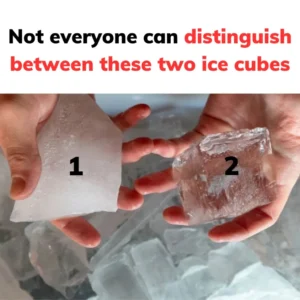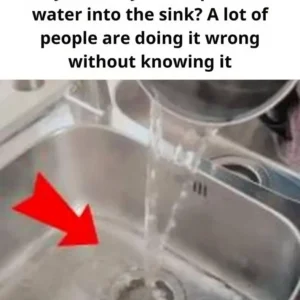Have you ever noticed that some ice cubes are crystal clear while others are cloudy and milky? It turns out that there’s an interesting reason behind this difference, and it all boils down to the water you use and how it’s frozen.

Cloudy ice often forms because of the type of water you use. Regular tap water, which many people use to make ice, contains impurities. These impurities include substances like lime, calcium, fluoride, nitrates, magnesium, and other organic materials. Some of these are beneficial for your health, while others may not have much of an impact. However, these impurities are invisible when the water is in its liquid state—you can’t detect them just by looking at a glass of water.
When you freeze regular tap water, the cooling process begins from the outside and works its way toward the center. As the water freezes, the impurities get pushed to the middle of the ice cube. This central cluster of trapped impurities is what creates that cloudy, white appearance in the middle of the ice.
On the other hand, ice cubes that are clear and transparent are usually made with either boiled water or bottled mineral water. Boiling the water helps remove some of the dissolved gases and impurities that make the ice appear cloudy. In addition, using purified bottled water also ensures that the ice remains free of many of the impurities that cause cloudiness.
There’s also a technique called “directional freezing” that can help make ice cubes perfectly clear. This method freezes water in one direction, allowing impurities and gases to escape, resulting in ice that looks almost like glass. While this technique is a bit more complex than simply filling up an ice tray and sticking it in the freezer, it’s often used by professional bartenders who want visually appealing ice for cocktails.
If you’re at home and you want to make clearer ice without any special equipment, you can try boiling the water twice before freezing it. This will help eliminate even more impurities and gases, giving you a much better chance of achieving that clear, glass-like ice. However, keep in mind that even with boiled water, it’s not always perfect—sometimes, a bit of cloudiness can still form, depending on the freezer environment.
So, why does any of this matter? Well, beyond just looking cool (pun intended), clear ice is often considered to be higher quality and melts more slowly compared to cloudy ice. This can be important for those who enjoy their drinks without the ice watering them down too quickly.
Next time you reach for an ice cube, take a moment to notice whether it’s clear or cloudy. It’s a small detail, but it tells you a lot about the water and process used to make it. Who knew something as simple as ice could be so fascinating?





